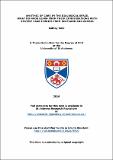Files in this item
An ethic of care in the dialogical space : what do NGOs learn from their conversations with states? : case studies from Scotland and Zambia
Item metadata
| dc.contributor.advisor | Watson, Alison M. S. | |
| dc.contributor.author | Cole, Ashley | |
| dc.coverage.spatial | 234 p. | en_US |
| dc.date.accessioned | 2016-11-29T11:44:58Z | |
| dc.date.available | 2016-11-29T11:44:58Z | |
| dc.date.issued | 2016 | |
| dc.identifier.uri | https://hdl.handle.net/10023/9900 | |
| dc.description.abstract | The increase in the presence and influence of Non-Governmental Organisations (NGOs) locally and internationally is having a noticeable effect on the policy process at a national level. While the NGO sector is more commonly examined at an international level, its impact at the state and sub-state level remains unexplored. This gap in the literature is addressed as a primary problem in this thesis. By exploring the relationship between the NGO and the state, the significance of this relationship is emphasised as a necessary inclusion in International Relations literature. The NGO sector presents civil society with a road into, and in some cases an alternative to, traditional modes of political advocacy. This increases civil society’s ability to impact the policy process by creating, what is identified in this thesis as, a dialogical space. The dialogical space allows for an exchange of ideas and thus influences the decision-making process of the state, if and when it is explored. Furthermore, the dialogical space facilitates, as is shown here, learning through the conversations that take place between NGOs and the state. This thesis asks ‘what do NGOs learn from their conversations with states?’ and presents the ‘lessons learned’ from Scottish and Zambian case studies. NGOs are identified here as civil society in organisation and have a particular relationship with the communities they represent. This relationship is empirically examined and presented here in the Scottish and Zambian case studies. This thesis examines the relationship between the NGO and civil society, and most importantly the relationship between the NGO and the state using the ethic of care as a theoretical lens. Conclusions are drawn from the interviews conducted during the fieldwork. The ethic of care is located in practice and used as a theoretical lens to examine what the local NGOs learn from their interactions with the state. Both case studies confirm that an ethic of care is a prevalent ethic in NGO practice, as identified by the NGO workers interviewed. Furthermore, when used as an analytical lens the ethic of care is shown to be used as a tool by NGOs to nurture an ethic of care in statesmanship. The thesis specifically highlights that NGOs have learned from their conversations with states and that, through the creation and use of the dialogical space, an ethic of care in practice can be traced. The greater significance of this thesis is that it addresses the relationship between the NGO and the state at a local and national level; a topic which is lacking in current IR literature, despite being of crucial value for understanding the state’s interaction with non-state actors, in this case local NGOs. Furthermore, through the use of the ethic of care both as an exploratory lens and in its identification as a practical ethic, this thesis highlights the importance of an ethic of care in theory and practice. | en_US |
| dc.language.iso | en | en_US |
| dc.publisher | University of St Andrews | |
| dc.subject | Ethic of care | en_US |
| dc.subject | Civil society | en_US |
| dc.subject | NGO | en_US |
| dc.subject | Zambia | en_US |
| dc.subject | Scotland | en_US |
| dc.subject | Dialogical space | en_US |
| dc.subject.lcc | JZ4841.C76 | |
| dc.subject.lcsh | Non-governmental organizations--Case studies | en |
| dc.subject.lcsh | Non-governmental organizations--Scotland | en |
| dc.subject.lcsh | Non-governmental organizations--Zambia | en |
| dc.subject.lcsh | Civil society--Government policy--Case studies | en |
| dc.subject.lcsh | Civil society--Government policy--Scotland | en |
| dc.subject.lcsh | Civil society--Government policy--Zambia | en |
| dc.title | An ethic of care in the dialogical space : what do NGOs learn from their conversations with states? : case studies from Scotland and Zambia | en_US |
| dc.type | Thesis | en_US |
| dc.type.qualificationlevel | Doctoral | en_US |
| dc.type.qualificationname | PhD Doctor of Philosophy | en_US |
| dc.publisher.institution | The University of St Andrews | en_US |
This item appears in the following Collection(s)
Items in the St Andrews Research Repository are protected by copyright, with all rights reserved, unless otherwise indicated.

